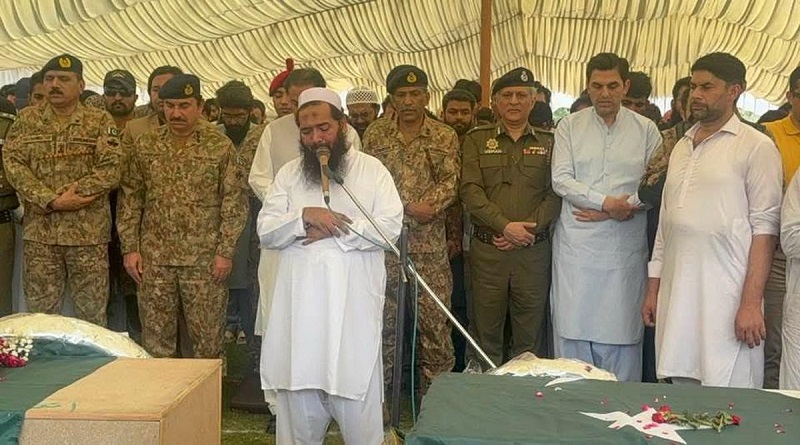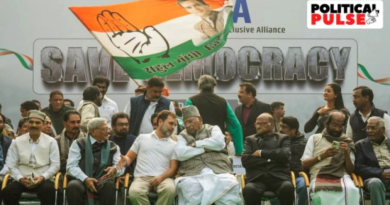Operation Sindoor: India kills 5 terrorists; Pakistan gave permission for last rites

Operation Sindoor: 5 top terrorists including Pakistani terrorist Abu Akasha killed
On May 7, 2025, India launched “Operation Sindoor,” a series of targeted airstrikes on nine locations in Pakistan and Pakistan-administered Kashmir, in retaliation for the April 22 terrorist attack in Pahalgam, Indian-administered Kashmir, which resulted in the deaths of 26 civilians. The operation aimed at dismantling terrorist infrastructure linked to groups such as Jaish-e-Mohammed (JeM) and Lashkar-e-Taiba (LeT)
Key Terrorists Eliminated:
The airstrikes led to the elimination of five prominent terrorists:
- Abu Jundal – Involved in the 1999 IC-814 hijacking and active in various terrorist activities in India.
- Hafiz Muhammad Jameel – Senior commander of LeT, responsible for several attacks in Kashmir.
- Yusuf Azhar – Key member of JeM, implicated in multiple terrorist operations.
- Mohammad Hasan – LeT operative involved in planning and executing attacks in India.
- Abu Akasha (Khalid) – A senior LeT operative, active in Jammu & Kashmir and involved in arms smuggling from Afghanistan.
Abu Akasha’s Background:
Khalid, known as Abu Akasha, was a high-ranking member of LeT and had been on India’s most-wanted list. He was implicated in several attacks in Jammu & Kashmir and had connections to arms trafficking from Afghanistan. His death in the airstrikes was confirmed by Pakistani officials, and his funeral was attended by senior military officers and the Deputy Commissioner of Faisalabad, indicating his significant status within terrorist circles.
Operation Sindoor: Strategic Response
The operation was a direct response to the Pahalgam attack, which India attributed to Pakistan-based militants. India’s Defence Minister, Rajnath Singh, stated that the strikes were “focused, measured, and non-escalatory,” targeting terrorist camps without hitting Pakistani military facilities. The use of Rafale jets equipped with SCALP missiles and AASM Hammer bombs, along with BrahMos cruise missiles and SkyStriker loitering munitions, underscored India’s advanced military capabilities.
Pakistan’s Reaction:
Pakistan condemned the airstrikes as an “act of war” and claimed to have downed several Indian aircraft in retaliation. The Pakistani military reported civilian casualties and infrastructure damage, while India denied these claims, stating that its aircraft were not hit. Both nations engaged in heavy cross-border shelling, leading to casualties on both sides and significant disruption to civilian life.
International Community’s Response:
The international community has expressed deep concern over the escalating tensions between India and Pakistan, both nuclear-armed nations. Following the recent missile exchanges, calls for de-escalation and dialogue have been issued by various global actors. The United Nations Secretary-General António Guterres emphasized the need for “maximum restraint” from both sides, stating that “the world cannot afford a military confrontation between India and Pakistan” .
The United States, through Secretary of State Marco Rubio, urged both nations to pursue de-escalation strategies to prevent further conflict and expressed willingness to assist in initiating constructive dialogue . China also called for restraint, with Foreign Minister Wang Yi expressing concern over the current tensions and advocating for dialogue to resolve issues . Additionally, countries like the United Kingdom, France, and Russia have echoed similar sentiments, urging both India and Pakistan to exercise caution and engage in diplomatic discussions to avoid further escalation .
Conclusion:
Operation Sindoor represents a pivotal moment in India’s counterterrorism strategy, underscoring its determination to confront and dismantle terrorist networks operating from Pakistan. The operation’s success in eliminating key militants, including Abdul Rauf Azhar, has been widely acknowledged as a significant blow to groups like Jaish-e-Mohammed and Lashkar-e-Taiba . However, the subsequent escalation, marked by extensive aerial engagements and retaliatory strikes, has heightened fears of a broader conflict between two nuclear-armed nations .
In this volatile environment, the role of global powers and international organizations becomes crucial in facilitating dialogue and promoting stability. The situation remains fluid, and the coming days will be critical in determining whether both nations can navigate this crisis without plunging the region into a prolonged and devastating conflict.






g1oahi